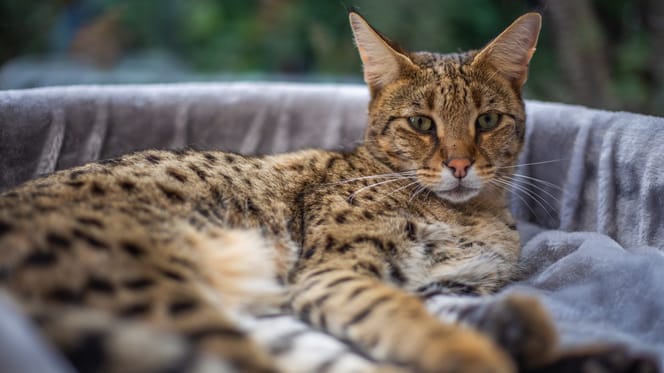It all started with a simple report. In the peaceful town of Kleve, in north-west Germany near the Dutch border, veterinary services were alerted to the presence of an unusual cat in a residential area. When authorities arrived, they discovered Muffin, a magnificent feline with a spotted coat... and a not-so-ordinary pedigree.
A wild nature
At first glance, Muffin looks like an elegant domestic cat: long legs, a slender build and bright eyes. Yet behind his refined feline appearance lies a much wilder heritage. Muffin is a first-generation Savannah cat, a direct cross between an African Serval and a domestic cat.
This mix creates a spectacular animal, often described as a "mini-leopard". But it's precisely this wild side that poses a problem.
Ban following anonymous complaint
The case took a serious turn after the veterinary service intervened. According to their findings, Muffin belongs to the F1 generation, meaning he's among the very first descendants of a Serval. These animals are considered unpredictable and possess physical strength far superior to that of a domestic cat.
City authorities then ordered his owners to part with the feline within two weeks. Deeming this measure unfair, the couple filed an appeal with the Düsseldorf administrative court. They argued that Muffin was affectionate, perfectly sociable and had never caused any incidents. But the judges didn't see it that way.
Judges find "considerable dangers"
The Düsseldorf administrative court first rejected the emergency request, a decision later upheld by the Higher Administrative Court of Münster. In its ruling issued in early October, the Court found that keeping such an animal is "neither usual nor harmless" within a residential area.
The grounds state that "keeping small animals" is only permitted if it is "usual and harmless" for the residential area. However, first-generation Savannah cats meet neither of these conditions.
A luxury cat with wild heritage
Savannah cats are considered status symbols. The price of these exotic cats can reach £8,500. Stars like Justin Bieber have made them popular.
But behind the appearance of an exceptional feline lies complex regulation. In Germany, as in France, keeping a Savannah F1 to F4 is strictly regulated. It requires special permits and secure facilities. More distant generations from the Serval (from F5 onwards) are considered domestic.
For Muffin's owners, the verdict came as a shock. They had hoped to keep their exotic pet. But they must now part with him permanently. An appeal is not possible.


